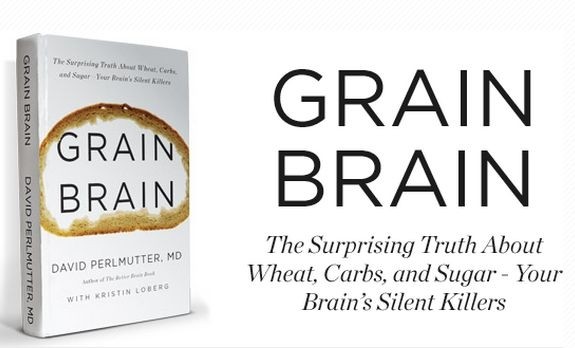'Misleading and sensationalist' Grain Brain book distorts science and confuses public with advice to avoid grains, say critics

That assertion is put forth in a soon-to-be-published book by Dr David Perlmutter called Grain Brain that has earned an endorsement from public awareness needle mover Dr Mehmet Oz.
In the book Perlmutter, who has a neurology practice in Naples, FL and who has authored other books on diet as it relates to cognitive health, makes a multi-faceted argument that most neurological conditions are preventable and diet is the key. The subtitle of the book is, “the surprising truth about wheat, carbs and sugar — your brain’s silent killers.”
“Although several factors play into genesis and progression of brain disorders, to a large extent numerous neurological conditions often reflect the mistake of consuming too many carbs and not enough healthy fats,” Perlmutter wrote.
What our ancestors ate
Perlmutter bases his dietary recommendations on what he says are the diets that our ancestors evolved on. He claims that ancient diets consisted of 75% fat, 20% protein and 5% carbohydrates. He contrasts that with the modern dietary recommendations, which work out to about 20% protein, 20% fat and 60% carbs.
Perlmutter claims that the dietary guidelines outlined in his book, which include eating no more than 50 grams of carbohydrates a day and the avoidance of most fruit, will positively affect a host of conditions including ADHD, migraines, epilepsy, mood disorders, Tourette’s syndrome “and much more.”
Grains of truth
“He has so many themes in there it’s hard to know what to talk about. It’s like a field that has good plants, some you are not so sure of and weeds,” Julie Miller Jones, PhD, professor emerita of foods and nutrition at St. Catherine University told FoodNavigator-USA.
“There is sound nutrition advice (in there). There are scintillas of truth,” Jones said. Jones spoke with FoodNavigator-USA at the Food Evolution Summit in Phoenix where she was acting as chairperson.

“He talks about the carbohydrates in grains and in fruit setting off the inflammatory pathways. If it is a brain disorder, then diet is the problem. He appeals to groups like older people who are afraid of losing it. He appeals to young parents who are afraid their children might turn out to be autistic,” Jones said.
Misleading picture
Jones said Perlmutter uses bits and pieces of the effects of diet on cognitive outcomes—that obese people have a higher risk of cognitive impairment, for example—to construct an ultimately misleading picture of what people should eat for optimal cognitive and overall health.
“We have really good data about with the DASH diet. The first data on it came out in the 90s. Half of that cohort got rid of their blood pressure medication, and also showed a lower risk of dementia. We have good data on the Mediterranean Diet, which has a lot of carbohydrates. It also shows a reduced risk of dementia,” she said.
Contributing to confusion

The Whole Grains Council echoed Jones’ concerns about the book.
“Grain Brain is a misleading and sensationalist title for a book that distorts current science and contributes, sadly, to public confusion about what constitutes a healthy diet", the group said in a statement.
Perlmutter trades on legitimate concerns about conditions related to carbohydrates such as celiac disease to push his particular slant on dietary recommendations, it added.
Among Perlmutter’s recommendations for his patients is the use of Protandim, a multi-ingredient antioxidant supplement manufactured and marketed by Utah-based network marketing company LifeVantage. Perlmutter is on the company’s scientific advisory board.
“Leading medical researchers in the area of gluten intolerance and celiac disease attest that there is no need for 90% or more of our population to avoid any grains,” the group wrote.
“Put simply, there is no evidence for the idea we should all avoid all grains. Perlmutter must realize this himself, since Grain Brain contradicts its main premise that all grains are injurious to brain health, and recommends eating, in moderation, ‘amaranth, buckwheat, rice (brown, white [sic], wild), millet, quinoa, sorghum, teff and [gluten-free] oats'."
Not sustainable
Jones said ultimately following the standard dietary guidelines and getting adequate exercise are the best ways to eat to protect your brain.
Perlmutter’s approach is unbalanced and while the foods he recommends might make sense in isolation, Jones questions whether most consumers could actually follow the whole program for long.
“He’s telling people to eat salmon, to eat avocados. Is that realistic? Will you get your kids to eat that for breakfast? Is that sustainable?” Jones asked.






















